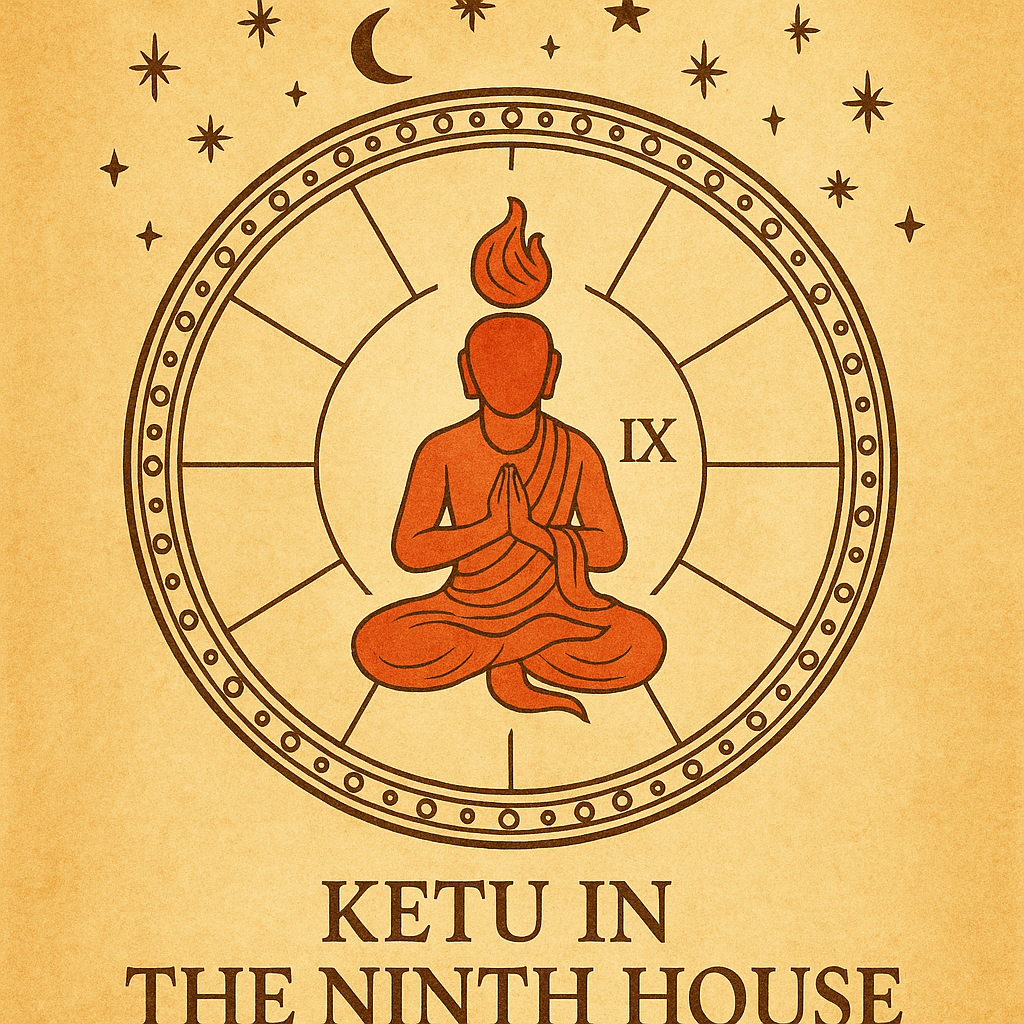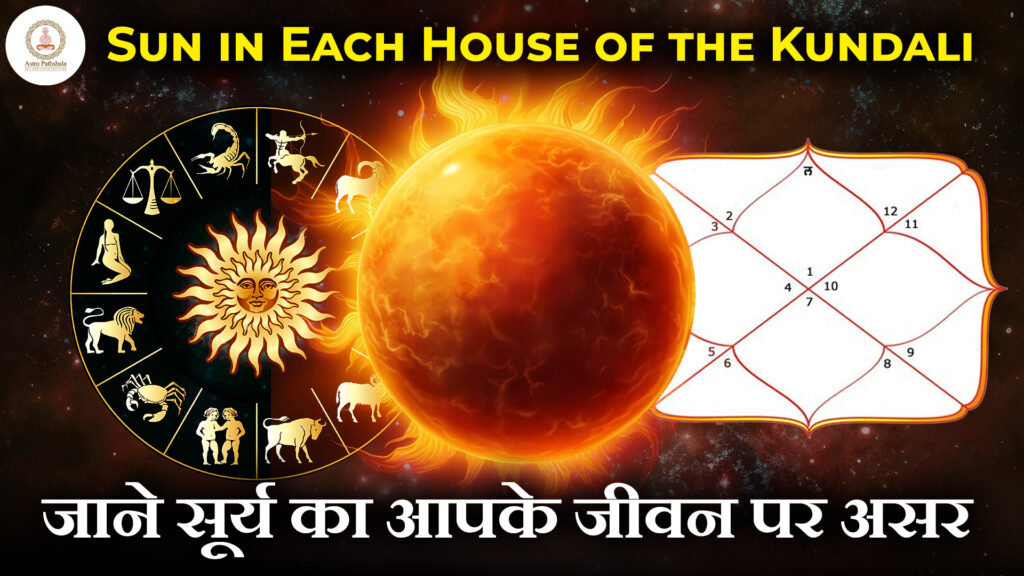
In the mystical realm of Vedic astrology, Ketu stands as a symbol of spirituality, karmic residue, and liberation. As the shadowy south node of the Moon, Ketu doesn’t have a physical form; it represents detachment from the material plane and a pull toward inner transformation. Its position in the horoscope reveals past-life experiences, areas of spiritual disconnection, and where the native is being called to let go and evolve.
Ketu is placed in the Ninth House showing the house of dharma, wisdom, and higher purpose. It indicates a unique karmic journey tied to faith, philosophy, teachers, and the quest for truth. This placement can bring both confusion and enlightenment in matters of belief, education, and spiritual path.
Understanding the Ninth House in Vedic Astrology
The Ninth House, known as Dharma Bhava, is one of the most sacred and spiritually elevated houses in Vedic astrology. It is the house that represents higher consciousness, philosophical thought, and the individual’s relationship with universal truth. While the Fifth House governs personal intelligence and creativity, the Ninth House expands this toward wisdom, purpose, and divine alignment.
Let’s explore the key domains of the Ninth House in more depth:
Religion, Spirituality, and Higher Beliefs
At its core, the Ninth House governs one’s connection to divine order, religious practices, spiritual leanings, and belief systems. It reflects how an individual perceives God, truth, or cosmic law. Whether a person follows an organized religion, walks a solitary spiritual path, or embraces agnosticism, all of this can be understood through the state of the Ninth House.
A strong Ninth House often indicates deep faith, a devotional nature, and a sense of moral clarity, whereas affliction may result in skepticism, confusion, or dogmatic tendencies.
Long-Distance Travel and Pilgrimage
This house is also associated with journeys, especially those undertaken for growth, learning, or spiritual merit. These include:
- Foreign travel for education or religious purposes
- Pilgrimages to sacred sites
- Explorations that lead to philosophical transformation
Unlike the Third House, which relates to short trips, the Ninth House rules long-distance or foreign journeys that shape one’s worldview. Such travel often becomes a turning point in one’s spiritual or intellectual journey.
Teachers, Mentors, and Gurus
In Vedic astrology, the Ninth House signifies the Guru—one who dispels darkness and brings light through knowledge. This house reflects:
- The quality of guidance received from teachers, elders, or spiritual mentors
- One’s openness to learning and ability to respect higher wisdom
- The karmic relationship with authority figures in spiritual and academic settings
A well-placed Ninth House indicates respect for dharma and receptivity to wise counsel, while afflictions may lead to rebelliousness or mistrust toward teachers and traditions.
Higher Education and Philosophical Studies
Beyond basic learning (ruled by the Fourth House), the Ninth House governs higher education, such as:
- University degrees and postgraduate studies
- Studies in philosophy, religion, law, or ethics
- The quest for knowledge that transcends material goals
It reflects how far a person is likely to go in their academic or philosophical pursuits and whether they seek education for status, truth, or inner fulfillment.
Ethics, Values, and Life Principles
The Ninth House shapes an individual’s moral compass. It governs:
- One’s sense of right and wrong
- Personal code of conduct and dharma (righteous duty)
- The values instilled by tradition, family, or past-life karmas
This house plays a vital role in determining whether a person acts out of selfish desire or higher principle. A strong Ninth House fosters justice, fairness, and alignment with truth, while a weakened one may cause confusion around ethics or blind faith.
Luck, Fortune, and Divine Grace (Bhagya)
Also known as the house of fortune, the Ninth House reflects Bhagya—one’s inherent blessings or divine grace. It shows:
- The flow of luck and ease in life
- The support one receives from destiny
- The unseen karmic rewards earned through past-life actions
People with a beneficial influence in the Ninth House often experience unexpected support, timely opportunities, or guidance from higher forces, especially during difficult times. It is said that the Ninth House shows how God intervenes when human effort fails.
The House of Dharma and Higher Meaning
Ultimately, the Ninth House guides us toward dharma—the path we must walk to fulfill our spiritual and moral purpose. It compels the native to look beyond immediate gratification and align with universal truth and soul integrity. This house is the bridge between human experience and divine wisdom, showing us that life has a purpose beyond survival or success.
When planets like Ketu occupy the Ninth House, they bring a karmic dimension to these themes, often challenging conventional belief systems while awakening the need for inner truth and self-directed spirituality.
What Does Ketu Represent in the Ninth House?
Ketu in the Ninth House creates a karmic scenario where the soul has already experienced or mastered the external aspects of religion, culture, and philosophy in past lives. In this incarnation, the person may feel:
- Detached or disillusioned with traditional religious structures
- Internally conflicted about belief systems and spiritual guidance
- A strong yet ambiguous pull toward spiritual truth
- Difficulty in accepting authority figures, teachers, or gurus
Ketu here doesn’t deny spiritual growth—but it redirects it inward, away from dogma and toward personal truth and mystical experience.
Positive Effects of Ketu in the Ninth House
When placed beneficially or supported by aspects from Jupiter or other favorable planets, Ketu in the Ninth House can manifest powerful and transformative spiritual qualities:
Innate Spiritual Wisdom
The native may possess a deep intuitive understanding of spiritual truths, even without formal education. They may remember or revive past-life spiritual practices such as meditation, tantra, or mysticism.
Interest in Mystical Philosophy
Rather than blindly following established doctrine, the native explores alternative spiritual paths, Eastern philosophies, or occult sciences such as astrology, metaphysics, and past-life regression.
Strong Moral Compass
Despite rejecting dogma, these individuals often live by a self-developed code of ethics, drawn from inner wisdom rather than social or religious norms.
Karmic Teachers and Gurus
The person may encounter unconventional spiritual guides or receive insights through dreams, silence, or nature instead of formal education or institutional religion.
Travel for Inner Purpose
They may take spiritual journeys or pilgrimages—not to tourist destinations, but to remote, sacred, or energetically charged places. Such travel becomes a catalyst for inner growth.
Challenging Effects of Ketu in the Ninth House
If afflicted by malefic aspects or placed in an incompatible sign, Ketu’s influence can become more difficult:
Confusion in Faith and Belief Systems
The person may struggle to find a belief system they resonate with, or they may frequently shift between different ideologies, never fully committing.
Detachment from Gurus and Teachers
There may be a disconnect or mistrust of mentors or spiritual leaders. The person may feel let down by their teachers or resist guidance altogether.
Rebellion Against Tradition
This placement often makes the native question or reject cultural, familial, or societal beliefs—sometimes to the point of isolation or alienation.
Blocked Higher Education
There may be obstacles or interruptions in attaining higher education, especially in traditional fields. The person may either drop out, change paths frequently, or choose self-education over formal degrees.
Feeling Unlucky or Forsaken
Since the Ninth House also rules fortune and divine grace, Ketu here can create periods where the person feels cut off from luck, blessings, or spiritual support, especially in their youth.
Ketu in the Ninth House for Different Ascendants
The results of this placement also vary by Ascendant (Lagna):
- Aries Ascendant: Ketu in Sagittarius – Deeply philosophical but may reject religious authority; ideal for mystical teachers or travelers.
- Taurus Ascendant: Ketu in Capricorn – Detached from rigid tradition; skeptical but disciplined in spiritual pursuit.
- Gemini Ascendant: Ketu in Aquarius – Spiritual rebel, seeker of unconventional truths; may excel in mystical sciences.
- Cancer Ascendant: Ketu in Pisces – Extremely intuitive and mystical; likely to have psychic dreams or prophetic visions.
- Leo Ascendant: Ketu in Aries – Individualistic beliefs, often pioneers their own spiritual system.
Remedies for Ketu in the Ninth House
Ketu’s energy is subtle and spiritual, so its remedies are less about material correction and more about inner alignment and energetic purification:
Chant Ketu Beej Mantra
“Om Sram Sreem Sraum Sah Ketave Namah”
Chanting this mantra daily (especially during Ketu’s dasha/antardasha) helps align your energy with Ketu’s frequency.
Respect Teachers and Elders
Consciously develop a healthy attitude toward mentors, gurus, and elders, even if you don’t always agree with them. Ketu can cause disrespect—balance it with humility.
Pilgrimage or Travel to Sacred Places
Visit places of spiritual power, such as old temples, ashrams, or remote shrines. These journeys activate the Ninth House and help dissolve Ketu’s karmic residue.
Donations and Seva (Selfless Service)
Offer donations on Tuesdays or Saturdays, especially to monks, spiritual seekers, or those pursuing higher education. Serve without expectations.
Avoid Blind Rejection of Faith
Stay open to spiritual truth without clinging to nihilism or excessive skepticism. Meditation, mindfulness, and reflective reading can bridge the gap between logic and belief.
Wearing Cat’s Eye (Lehsunia)
Under a qualified astrologer’s guidance, Cat’s Eye gemstone may be used to strengthen beneficial aspects of Ketu—but only if it suits your birth chart.
Conclusion
Ketu in the Ninth House offers a deeply spiritual, though sometimes confusing, path. It dissolves the external forms of religion and forces the soul to seek its truth within. There may be disillusionment with tradition, blocks in education, or mistrust of teachers—but these challenges are meant to turn the native inward, toward self-realization.
This placement is not meant for those who seek ready-made truths or clear paths—it’s for those brave enough to journey through uncertainty, questioning, and surrender. When embraced consciously, Ketu in the Ninth House can awaken divine wisdom, personal dharma, and mystical insight far beyond the ordinary.
Visit our website Astro Pathshala to explore more about the astrological facts about the presence of Ketu in the birth chart.
Ketu in Fourth House: Spiritual Lessons Explained


